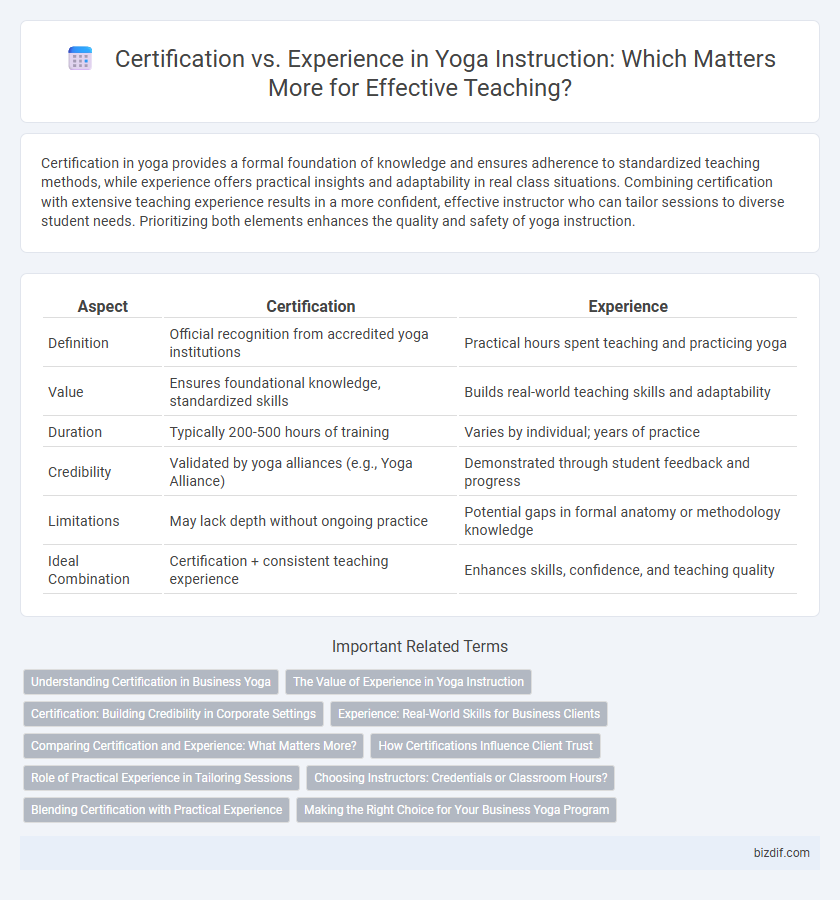Certification in yoga provides a formal foundation of knowledge and ensures adherence to standardized teaching methods, while experience offers practical insights and adaptability in real class situations. Combining certification with extensive teaching experience results in a more confident, effective instructor who can tailor sessions to diverse student needs. Prioritizing both elements enhances the quality and safety of yoga instruction.
Table of Comparison
| Aspect | Certification | Experience |
|---|---|---|
| Definition | Official recognition from accredited yoga institutions | Practical hours spent teaching and practicing yoga |
| Value | Ensures foundational knowledge, standardized skills | Builds real-world teaching skills and adaptability |
| Duration | Typically 200-500 hours of training | Varies by individual; years of practice |
| Credibility | Validated by yoga alliances (e.g., Yoga Alliance) | Demonstrated through student feedback and progress |
| Limitations | May lack depth without ongoing practice | Potential gaps in formal anatomy or methodology knowledge |
| Ideal Combination | Certification + consistent teaching experience | Enhances skills, confidence, and teaching quality |
Understanding Certification in Business Yoga
Certification in business yoga establishes standardized knowledge and skills crucial for teaching corporate clients, ensuring credibility and client trust. Experience enhances practical application and adaptability in diverse business environments, fostering personalized instruction and client engagement. Balancing certified credentials with hands-on experience optimizes teaching effectiveness and professional growth in the corporate yoga industry.
The Value of Experience in Yoga Instruction
Experience in yoga instruction cultivates a deep understanding of body mechanics, student needs, and class dynamics that certification alone cannot fully provide. Seasoned instructors develop intuitive adjustments and personalized teaching methods that enhance safety and progress for diverse practitioners. Practical experience also fosters empathy and communication skills, ensuring a more impactful and holistic yoga practice.
Certification: Building Credibility in Corporate Settings
Certification in yoga instruction plays a critical role in establishing credibility within corporate settings, signaling adherence to standardized training and ethical guidelines. Corporations often prioritize certified yoga instructors to ensure safety, professionalism, and consistency in wellness programs. Holding a recognized certification enhances trust among employees and aligns with corporate policies focused on health and liability management.
Experience: Real-World Skills for Business Clients
Experience in yoga instruction cultivates practical skills essential for addressing diverse client needs and adapting sessions effectively, which certifications alone may not provide. Real-world engagement enhances understanding of business clients' unique goals, fostering tailored programs that drive client retention and satisfaction. This hands-on expertise proves invaluable for building trust and demonstrating professionalism in a competitive yoga industry.
Comparing Certification and Experience: What Matters More?
Certification provides formal training and ensures adherence to standardized yoga teaching methods, enhancing credibility and trust among students. Experience, however, cultivates intuitive understanding, adaptability, and personal growth in instructing diverse practitioners effectively. Balancing certification with hands-on teaching experience yields the most well-rounded and impactful yoga instructor.
How Certifications Influence Client Trust
Certifications provide a tangible proof of expertise that significantly boosts client trust in yoga instruction by validating the instructor's knowledge and skills through recognized standards. Clients often perceive certified instructors as more credible and accountable, reinforcing confidence in their guidance and safety during practice. While experience enhances practical skillsets, certifications serve as essential benchmarks that reassure clients of an instructor's commitment to professional development and ethical teaching.
Role of Practical Experience in Tailoring Sessions
Practical experience plays a crucial role in tailoring yoga sessions to meet individual needs by allowing instructors to observe and adapt to students' physical abilities and limitations. Certification provides foundational knowledge and standardized techniques, but hands-on experience deepens understanding of body mechanics and personalized modifications. This real-world insight enhances the effectiveness and safety of yoga practice beyond theoretical training.
Choosing Instructors: Credentials or Classroom Hours?
Selecting yoga instructors involves balancing certification credentials with practical classroom hours to ensure quality teaching. Certification validates an instructor's mastery of techniques and adherence to safety standards, while extensive classroom experience demonstrates their ability to adapt practices to diverse student needs effectively. Prioritizing instructors who combine recognized credentials with substantial teaching hours enhances the overall learning experience and promotes student well-being.
Blending Certification with Practical Experience
Blending yoga certification with practical experience enhances teaching effectiveness by combining theoretical knowledge with real-world application. Certified instructors benefit from a structured curriculum, while hands-on practice refines their ability to adapt poses and sequences to diverse student needs. This synergy ensures a comprehensive understanding of safety, alignment, and student engagement, elevating overall class quality.
Making the Right Choice for Your Business Yoga Program
Choosing between yoga certification and hands-on experience depends on your business goals and target audience. Certification provides credibility and meets industry standards, enhancing trust with clients and aligning with insurance requirements. Deep experience ensures practical skill mastery and authentic teaching, delivering a richer, more adaptable yoga program tailored to diverse student needs.
Certification vs Experience Infographic

 bizdif.com
bizdif.com